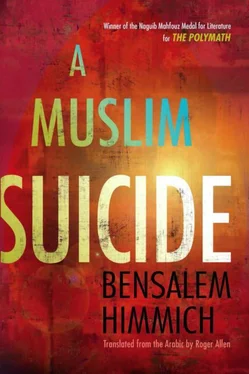To which the person knocking replied, "It's Fayha', 'Abduh. I'm Fayha'!"
I rushed to put my bed back where it belonged and hid my scratched neck underneath the tail-ends of my turban. Opening the door to my beloved wife and savior, I hugged and kissed her for all I was worth, and she returned my gestures of love and longing. When she seemed surprised that my room was in such a mess, I claimed that I was in the process of cleaning and rearranging things.
"That's a woman's job," she said.
"And a man's too," I replied. "There are various tasks where men and women have equal responsibilities!"
I sat my wife down next to me and asked her about her family in Tangier and what she had been doing, hoping that, by so doing, I could change the conversation topic and divert her attention. She told me that everyone was fine; they all sent me their greetings and hoped to see me soon. She went on to tell me about various projects she had completed in the city, including ordering household items and clothes, some of which were for me. But she had nothing to say about her charity work on behalf of the indigent and orphans similar to what she was doing in Sabta…
I spent some lovely intimate moments with her. I drew her head to my chest so she would not notice the scars on my neck. For a while I spoke to her about my own work and my worries concerning my students, about whom I had not heard anything for some time. She whispered some soothing words in my ear, then stood up to leave.
"When it's time to break your fast, 'Abduh," she said, "Abla can come and clean your room and rearrange things. Then we can rest and relax a little."
If my wife had not reminded me that I had earlier pretended to be fasting, purely as a means of self-protection, I would have taken her away to do the kind of things that God and his Messenger have permitted a passionate and hungry husband to do with his wife. Instead, only a short while after she had withdrawn 'Abla appeared, eyes downcast and showing signs of modesty and bashfulness. Without uttering a word she started sweeping and cleaning the room. Suddenly, however, another servant-woman, Hafsa, appeared, gestured to 'Abla to leave, and threw her out. She took over from the poor girl, and started rearranging the furniture with commendable skill. The only times she looked in my direction were to throw arrogant, brazen glances at me. Once finished, she departed without a word and slammed the door.
Never before had I set eyes on a servant like this Hafsa. She looked sturdy and strong, flat-chested, with short hair and a tawny complexion. She scowled and squinted a lot. Had she been given free rein to do what she wanted with me, she could easily have either lifted me up to the ceiling or stomped me on the ground. Now more than ever before I came to realize the incredibly offhand and rude way in which this giantess was treating me. I praised God that at least she was not in love with me and that He had provided me with such a woman as protection against 'Abla's brash provocations. It would be Hafsa whom I would ask to serve me if my wife had to travel again.
As the muezzin called the sunset prayer, I heard Fayha' calling me to "break my fast." I could do nothing but respond. The table of food that awaited my arrival in the private quarters was piled high with every kind of dish that the human soul could desire. I broke my would-be fast with the customary prayer, asking God to forgive me for such deception, then urged my wife, who was sitting by my side, to join me in eating. She did so, but only a little. I asked her about Hamada, and she told me that he would be coming back soon when he had completed certain tasks she had asked him to do.
Hafsa was acting as our servant, and she used the occasion to show her many virtues, not least the management of household affairs. My wife asked me if I agreed with her high opinion of Hafsa, and I told her that I did. She had the opposite to say about `Abla because she was still very inexperienced and had not learned how to behave prudently. As an excuse she pointed out that 'Abla was very young and went on to tell me that the girl had only acquired a family when her late father took charge of her; till the age of eleven she had lived in an orphanage. By contrast, Hafsa was in her forties. My wife told me that she was experienced in the ways of the world, very strong and not a little stubborn. With her quick temper in mind, it was no wonder that she was still unmarried. Her late father had wanted her to be well cared for, so he had bequeathed her to Fayha'. My wife also told me that Bilal had also come to her household as part of the same bequest; her late father had manumitted him from a cruel previous owner who had cut out his tongue, claiming that Bilal kept talking without permission or need. I was already noticing that this poor giant of a man took the greatest pleasure in serving his mistress and her entire household with a truly rare sense of devotion. On Fridays and festival days he also valued the opportunity to pay an early morning visit to the grave of Rayhan the African in Hajar al-Sudan, after which he would return to the alley where the house was and show his organizational skills by making needy invalids stand in line while he helped distribute as many alms as we could afford.
With my beloved's return I recovered my emotional equilibrium and, along with it, my ability to focus on the religious and secular sciences that I found most valuable. I spent days and weeks, not only studying but also writing essays and composing new sections for my book, Escape of the Gnostic, as well as doing some useful editing of the parts I had already written.
FROM THE FOURTH YEAR of my stay in Sabta onward, events and news about them started to speed up. The governor of Sabta, Ibn Khalas, wrote to me that Frederic, the Christian king, had liked my responses to his questions and sent another valuable gift, even though I had turned down the first one. The governor suggested that, if I so wished, I was entitled to receive the gift from the governor's residence. I sent my reply straight back to the governor, to the effect that I continued to reject all gifts from kings. My justification, already dispatched to the ruler of the Christians, had not changed, based as it was on God's own words in the Qur'an: "Say: I shall not ask for any reward for it, save for love of those near and dear" [Sura 42, v. 23]. If the king pretends not to understand, I pointed out, then tell him-as I have already done-that "those near and dear" refers to the Muslims in Spain, while the hoped-for "love" implies coming to their aid in resisting the armed conflict and hatred aimed at them by the Castilians and their allies. I informed the governor that I would be composing a letter to the king in which I would outline the kinds of support that would be requested of him. In God alone is success.
The second wonderful event that caused me great delight was the arrival of a group of my students at noontime on Sunday. After asking 'Abla to show them in, I kissed them one by one, spoke to each of the seniors among them, and introduced myself to the new ones. I asked them all to sit with me in my prayer-cell, using various prayer rugs and mats. The young girl made her way among them in her diaphanous veil, flitting around like a little bird, smiling all the while as she offered them all some sustenance from trays full of drinks, sweets, and loaves of bread. 'Abd al Al-Sadiq, and 'Adnan all whispered their congratulations on my marriage and my new abode. Then all of a sudden Hafsa appeared at the door and ordered `Abla to leave the room at once and follow her. All the poor girl could do was to obey and leave.
`Abd al who had not been paying any attention to what was going on, leaned over and told me that the purpose of the group's visit was to revive the old disciple relationship and check on my well-being. He went on to say that the students present were all people whom he knew to be polite and courteous. Just like the old trio, they were all inhabitants of Granada; they had crossed the straits specifically so that they could study with me for a while before returning to their jobs in their own cities. Al-Sadiq told me that other students from Sabta were patiently waiting outside the quarter until such time as I would be willing to arrange a time for a meeting in the city mosque. From people close to me I learned that my sayings had been circulating among people and were so popular that everyone wanted more.
Читать дальше












